Communication is an in-demand skill set. It consistently tops lists from employers of skills they desire most in new hires. Ironically, it also tops lists from graduating MBAs of skills they wish they’d had more of in business school. Recently, I started teaching graduate business communication at the University of Iowa’s Tippie College of Business. The focus is writing and speaking in a professional setting.
As a professional speaker and reformed theatre major, giving advice on speaking comes naturally to me. Though I’ve been a professional writer for nearly two decades, it’s been a bit of a long and winding road. My first job was as a copywriter at an educational publishing company writing flyers for workbooks. From there I became a blogger, creating digital marketing content to support my consulting work. All of this led to me writing a book two years ago. I have another one coming later this spring.
In addition to “living by my pen” as author John LeCarre says in his bio, I’ve also read a lot of books on writing. I revisited many of them in preparation for teaching this course. Here are a few that may help you and your writing.
The Elements of Style by William Strunk and E.B. White
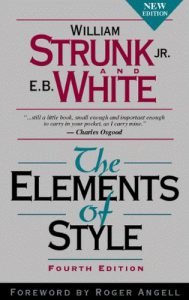 “…still a little book, small enough and important enough to carry in your pocket, as I carry mine.” This quote from Charles Osgood sits smack dab in the middle of the cover of The Elements of Style by William Strunk Jr. and E.B. White. It had been years since I first picked up this slim primer featuring the writing lessons of Strunk augmented with care by his former student E.B. White. With classic tips like “Omit needless words” and “brevity is a by-product of vigor,” I fell in love with this book again after re-reading it last summer. If you haven’t read it, amend that. It’s the one book on writing everyone needs to read.
“…still a little book, small enough and important enough to carry in your pocket, as I carry mine.” This quote from Charles Osgood sits smack dab in the middle of the cover of The Elements of Style by William Strunk Jr. and E.B. White. It had been years since I first picked up this slim primer featuring the writing lessons of Strunk augmented with care by his former student E.B. White. With classic tips like “Omit needless words” and “brevity is a by-product of vigor,” I fell in love with this book again after re-reading it last summer. If you haven’t read it, amend that. It’s the one book on writing everyone needs to read.
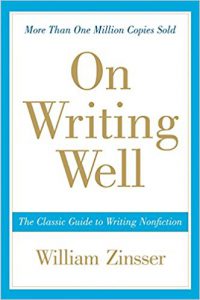 On Writing Well by William Zinsser
On Writing Well by William Zinsser
Zinsser takes the framework of Stunk and White and further reinforces the idea of de-cluttering your writing, which he explores in detail showing you how he edited a chapter of On Writing Well complete with markups. The book includes important foundational principles on voice (“Don’t write anything you wouldn’t say — it should sound like you”) as well as rules for common nonfiction formats such as interviews and technical writing.
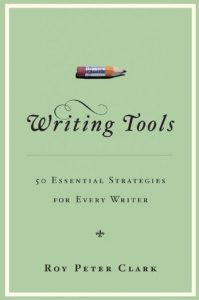 Writing Tools by Roy Peter Clark
Writing Tools by Roy Peter Clark
Tools, by definition, are helpful, useful. Clark’s Writing Tools: 55 Essential Strategies for Every Writer is the best tactical, practical book on the mechanics of writing. Case in point — the subtitle for Part One is “Nuts and Bolts.” Every bit the Poynter Institute scholar, Clark notes that these are “tools not rules.” The book also features engaging, abstract tools like “Get the name of the dog” and “write from cinematic angles” as well as writing assignments at the end of each chapter.
 Bird by Bird by Anne Lamott
Bird by Bird by Anne Lamott
The winner of the writing book with the most curious name has to be Lamott’s kicky Bird by Bird. As a child, her brother was overwhelmed by a book report on birds. Her father’s advice? “Take it bird by bird.” Lamott too takes a laid-back approach in exploring both the writer’s process and personality. Tips on creating a “shitty first draft” and perfectionism address both of these critical aspects of the craft of writing.
 On Writing by Stephen King
On Writing by Stephen King
Confession: I haven’t read any of Stephen King’s other books. I don’t think I’m a great fit for his work. I am a slow reader who scares easily. But I have read On Writing. Half memoir and half writer’s toolbox, this loose, conversational read takes you inside the process of one our most prolific — and most read — authors. King brings his trademark horror to writers’ demons like adverbs and revising, as he details his workman-like approach to writing and life.
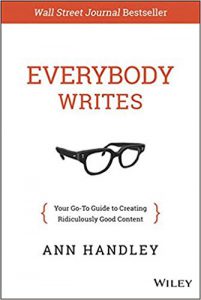 Everybody Writes by Ann Handley
Everybody Writes by Ann Handley
As someone who came up as a marketing copywriter, I’m quick to point out that all of our new digital formats — from tweets to ebooks to video scripts — involve writing. If you’re looking for something like The Elements of Style but focused on the latest digital marketing formats, look no further than Ann Handley’s go-to guide. Featuring writing tips and tools along with lessons on story and publishing, everybody who reads Everybody Writes will create better, more engaging content.
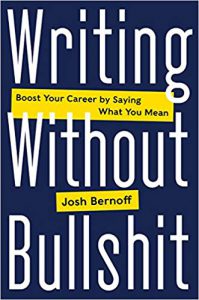 Writing Without Bullshit by Josh Bernoff
Writing Without Bullshit by Josh Bernoff
Bernoff’s book starts off with a bang. Specifically, it challenges business writers to uphold what he calls the Iron Imperative — treat the reader’s time as more important than your own. His thesis maintains that none of us were taught to write in ways that are effective, our work environment calcifies our bad habits further, and today’s technology (most of us are reading on small glass screens) makes this harder than ever. Writing Without Bullshit delivers strategies to help you do just that — write emails, blog posts, reports, and more — that stand out and get the job done.
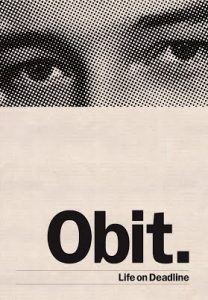 BONUS WRITING MOVIE! Obit
BONUS WRITING MOVIE! Obit
Obit was marketed as a documentary following the team of writers entrusted with memorializing luminaries, icons, and newsmakers for The New York Times. While this definition is accurate, it’s really much more than that. While the title of Vanessa Gould’s 2016 doc could sound macabre, it provides behind-the-scenes access to a unique set of writers struggling with some of the most common writing challenges — editing and writing on deadline.
Obviously, there are many more. But, as Stephen King notes early in On Writing, “most books about writing are bullshit.” These were the ones I found most useful across all aspects of writing — from style and mechanics to process and mindset.
Find what works best for you and keep writing. And rewriting. And get up and do it all again tomorrow.

